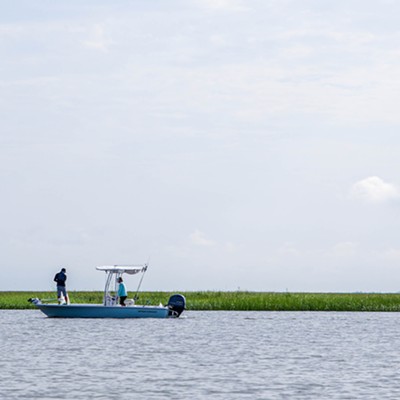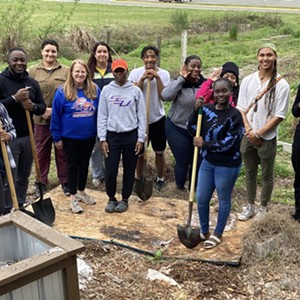I hope it’s not some sort of metaphor for my life. Ugly caterpillars have denuded my passion vine.
I realize that it’s not politically correct for a green gardener and deep ecology advocate to call a creature of nature ugly. I have lashed out in frustration, so I take a deep cleansing breath and regroup.
Caterpillars with wicked black spikes erupting from their shiny orange skin have been munching upon the foliage of the passifloria incarnata. The vine was about to bloom its otherworldly, Salvador Dali–esque flowers when they arrived.
Rapacious, indomitable eating machines. Scarcely a leaf and not a single flower bud remain.
What’s an organic gardener to do? In this case, I just suck it up. The caterpillars are on their journey to become gulf fritillary butterflies.
The most magical of insects, butterflies are a beloved symbol of transformation and beauty. I look at the tortured passion flower vine and think, “Oh, the brutality of butterflies.”
Nature is intense. Life in myriad forms is constantly coming into creation, eating and being eaten.
We humans are mostly oblivious to the copulations and births and carnage occurring incessantly around us. Except, of course, when we are directly involved in those activities.
Plants are being nibbled upon all the time but only gardeners and people who have perfection driven, expensive landscapes tend to notice when chunks of foliage go missing. Whatever insects or animals are behind the leaf massacre are not eating it to anger us.
You can be sure they aren’t eating it to incur a death rain of pesticides.They are eating to live. If it’s an important food plant, on a farm or in a home garden, then there is the question of how to deal with the creatures that are diminishing what you will harvest for personal nourishment or income.
Hopefully, you seek an equitable, earth friendly solution. When the attacked plant is an ornamental, there is less need to fight back.
My passion vine has become a sacrificial plant, devoured by caterpillars — with no human attempt to save it — so that the world will have more butterflies. The concept of planting flowers to attract butterflies is popular, but they equally need host plants. These are the specific plants and trees that each type of butterfly lays its eggs upon so that when the tiny larvae hatch they will be right in the dining room.
I brought the passionflower vine into my garden not knowing that it is the host plant for both gulf fritillary and zebra longwing butterflies. I have friends who grow parsley, dill or fennel with the expectation that the artfully patterned caterpillars of the black swallowtail butterfly will gulp down the herbs.
Their sacrificial offerings are always accepted, down to the naked stems.
In a rather macabre twist of nature, in addition to lovely butterflies that sip nectar from flowers there are beautiful butterflies that gather nutrients from rotting fruit, mud, human sweat and more repugnant things. It is not advisable to place carrion or excrement in your yard as part of your butterfly garden, but many butterflies would be pleased if you did.
Especially male butterflies. The minerals gathered from these unsavory sources are often used by male butterflies to prepare what is called a nuptial gift. During mating, this nutrient charged offering is transferred to the female butterfly and provides energy during egg development. A thoughtful gift, really.
When a butterfly lands upon your arm, the enchantment is not diminished because you know it has been attracted to your perspiration. Just don’t think of what he might have preferred! Instead, consider that your very own sweat may become part of a nuptial gift connecting you to future butterflies.
The website www.butterfliesandmoths.org gives an informative listing, with photos, of butterflies and moths found in Chatham County.



























